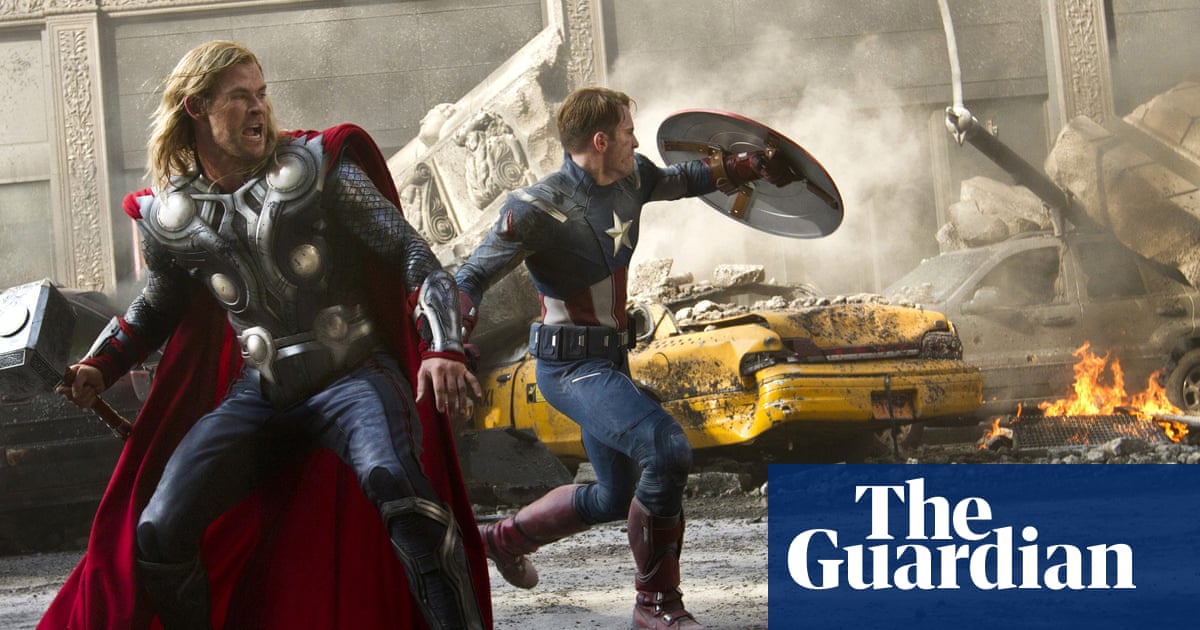Let’s face it, hanging around to watch post- or mid-credits sequences is a pretty weird thing. The movie is over, we’ve all had our fill – of CGI skybeams, multiversal migraines and superheroes punching each other in the feelings – and it’s time to head out into the night to debate whether the film was brilliant, baffling or just a $250m trailer for the next one. But leave we cannot, because something monumental might just happen after the credits roll. Or during them. Or, increasingly, not at all. Still we stay, we hope, we watch.
Remember the end of 2012’s The Avengers when Thanos turned and smirked, sparking a good six years of movies in which the Mad Titan wasdefinitelygoing to do something totally crazy very soon – and then, to everyone’s surprise,actually did? Or that glorious moment after Spider-Man: Homecoming (2017) when Marisa Tomei’s aunt May walked in on Peter Parker mid suit change? Back then,Marvelcredit scenes usually felt earned, and vital. They were windows into the future of the saga, at a time when Kevin Feige and his team seemed to be able to do no wrong. What made those early years so intoxicating was the sheer audacity of it all. Marvel wasn’t just making superhero movies. They were building a connected universe on screen, one meticulously cross-pollinated character cameo at a time, like a giant, exploding beehive of superhero synergy.
This kind of long-game storytelling had existed in comics for decades, of course, with Spider-Man swinging through a Fantastic Four panel or the Hulk popping up in someone else’s emotional breakdown – but to see it play out in Hollywood blockbusters was unprecedented. Suddenly, a throwaway joke in Iron Man 2 might lead to a plot-point in Captain America: The Winter Soldier. An alien artefact glimpsed in the background of Thor would become central to Guardians of the Galaxy. The post-credits scene wasn’t just a gimmick – it was the glue. A breadcrumb trail. A narrative lighthouse guiding fans through the fog of increasingly busy crossovers.
For a while, it worked, like a magic trick pulled off across a dozen movies, each new tease setting off a chain reaction of hype, speculation, and Reddit threads. But it wasn’t as if these end-of-movie scenes were all that vital to the filmgoing experience: they were just there to make us feel involved in the grand design of the Marvel macro-saga, like subscribers to a sprawling cosmic newsletter. We probably wouldn’t have even noticed much if they hadn’t been up to scratch – until one day, they really weren’t. Was it the arrival of Harry Styles’ Starfox and the Patton Oswalt-voiced Pip the Troll at the end of2021’s Eternalsthat was the tipping point? Here were a duo with all the relevance of a magician at a funeral. And OK, Eternals itself was more pointless than a fax machine at a Starlink board meeting, but that doesn’t mean Marvel didn’t have a duty to give us some kind of payoff at some point in the future of the franchise.
Instead we’ve had so many meaningless credits scenes that everyone is beginning to wonder if they should stick around for the inevitable feeling of disappointment. There was the bit at the end of Thor: Love and Thunder when Hercules – played by a surprisingly buff Brett Goldstein of Ted Lasso fame – steps into frame wearing comic-accurate gladiator gear, but says nothing memorable, flexes impressively and the scene cuts to black. Then there was Charlize Theron, striding into Doctor Strange in the Multiverse of Madness; she’s Clea, apparently – sorceress, niece of Dormammu, future wife of Stephen Strange in the comics – and she whisks our hero away with a vague threat about “incursions,” which, like most of Marvel phase four, sounded important but didn’t go anywhere. Perhaps she’ll turn up in the new Avengers films, but even if she does we’ll have absolutely no idea why.
Even Doctor Strange in 2016 teased a big heel turn for Chiwetel Ejiofor’s Mordo, who ended the film on a soul-sucking rampage to purge the world of “too many sorcerers”. A tantalising setup for a future clash! Which we didn’t get. By Multiverse of Madness, he’s been quietly swapped out for a different variant entirely.
So why are we still bothering to wait? The truth is that despite everything, there’s still a chance thatthis timethere will be one serious, monumental moment that blows our minds and reminds us of that bit at the end of Avengers: Infinity War when Nick Fury paged Captain Marvel just before crumbling into cosmic dust, and for a fleeting second it felt as if the future of the entire universe hinged on a single glowing beeper. Or we may finally have to admit that Marvel’s real superpower is making us continually sit through the credits for absolutely no reason at all.
